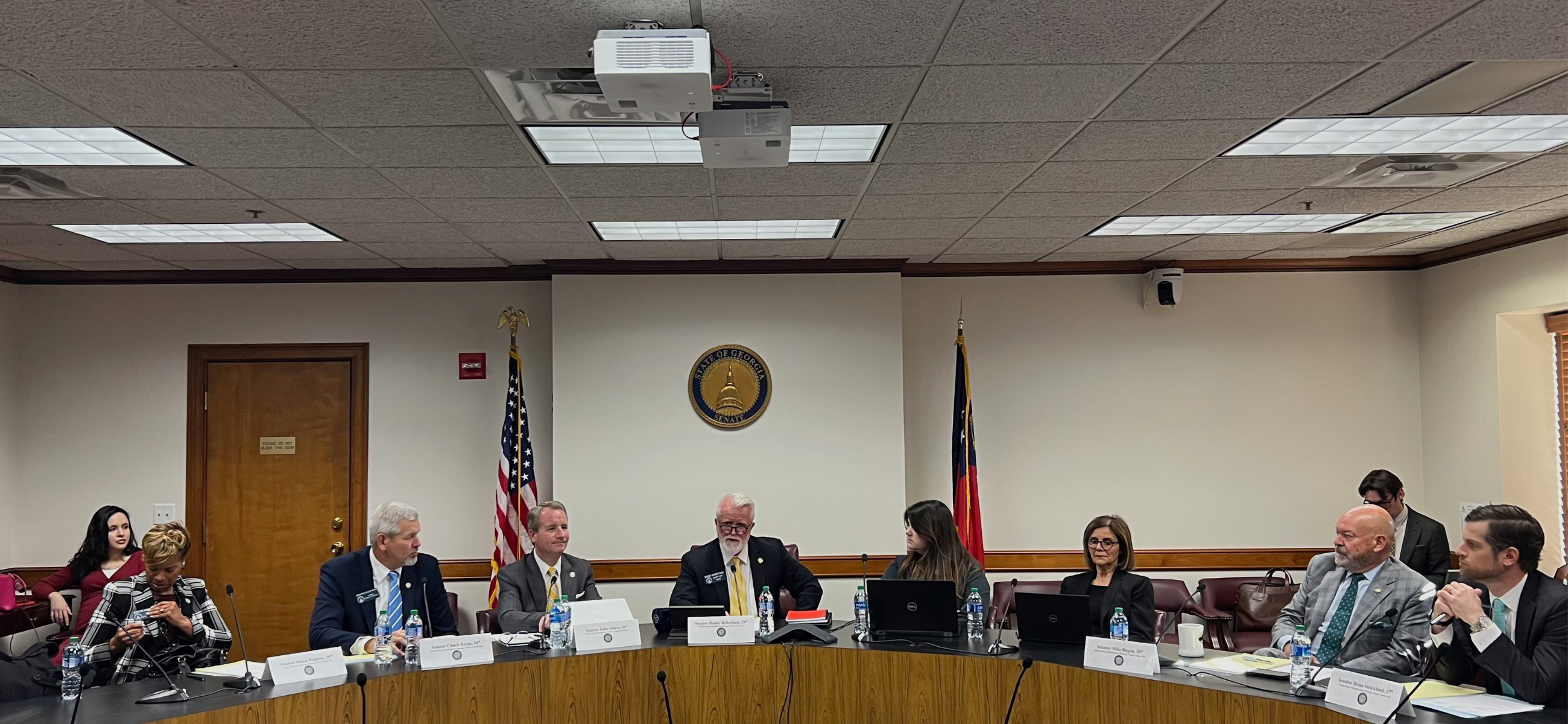Stay ahead of the curve as a political insider with deep policy analysis, daily briefings and policy-shaping tools.
Request a DemoSenate panel hears struggles, challenges of Fulton County Jail

The Senate Fulton County Jail Subcommittee. (Credit: Tammy Joyner)
The Gist
ATLANTA — A top aide in the Fulton County Sheriff’s Office gave lawmakers a searing account Thursday of life, and death, at the embattled Fulton County Jail.
Amelia Joiner, the sheriff’s office general counsel, told the Senate Subcommittee on the Fulton County Jail that detainees are held an average of 295 days in the jail — nearly 10 times longer than the expected 30 days, committee member Sen. John Albers, R-Roswell, noted.
Many in Fulton County Jail are mentally ill or awaiting trial for violent offenses in an overcrowded, violence-prone, deteriorating facility where 10 inmates have died so far this year, prompting the U.S. Department of Justice to launch an investigation in July.
“The Fulton County Jail operation presents us with an awe-inspiring realization,” Joiner said. “The Fulton County Jail is its own city. It is not a mere building or set of buildings. Rather, it is a microcosm of the community. It’s what our community looks like. Each of the nearly 3,000 detainees has his or her personality stresses, court cases, family, loved ones, medical and mental health needs, educational requirements and limitations. Running a facility of this size is a Herculean task.”
Thursday was the subcommittee’s first meeting. The subcommittee was formed last month to look into conditions at the jail.
The committee heard three hours of testimony from Joiner, representatives from the Georgia Sheriff’s Association, and Tate McCotter, executive director of the National Institute For Jail Operations who was there on behalf of the Georgia Jail Association.
What’s happening
The Fulton County Jail has five facilities, making it one of the largest jails in the southeast. But its main operation, the Rice Street facility in Atlanta, thrust the system into the national spotlight after reports emerged about the horrid conditions at the facility and detainee deaths.
Fulton County has 15 municipalities, many of which don’t have their own holding facilities or jails, Joiner said. As a result, the Fulton sheriff’s department is responsible for “housing detainees from all of those municipalities, as well as detainees from schools, universities, MARTA, police, state and federal law enforcement agencies,” Joiner said.
Joiner gave lawmakers an unvarnished view of how bad things are: As of Wednesday, 10 detainees have died. Two were homicides, four natural causes, and three are suspected overdoses. One cause of death is pending.
There have been 293 stabbings, 377 fights, 922 inmate-on-inmate assaults, 68 assaults on staff and one fire. Jail officials have confiscated 1,186 shanks and 133 cell phones.
At full-functioning capacity, the facility can hold 2,254 detainees. However, 308 beds are unusable, bringing the capacity to 1,875. “Yesterday’s [Wednesday] detainee population was 1,928 at the main jail,” Joiner said.
The jail has agreements with Atlanta and Cobb, Forsyth and Oconee counties to house overflow detainees. But sometimes those facilities can’t take detainees due to staff shortages, Joiner said.
“About 1,000 inmates in our custody suffer from severe or serious mental illness. The Fulton County Jail is very much a de facto mental health facility,” said Joiner.
Why It Matters
Fulton County’s facility, like many jails nationwide, has become a dumping ground for the mentally ill, said McCotter, adding that jails are taking on more detainees for longer periods of time with more duties and fewer staff, who have to endure abuse from the inmates. And that’s led to more risks and lawsuits.
“Jails are the largest liability in county government,” he said.
There’s a big difference between jails and prisons, McCotter said. “Prisons get everything in a nice package and bow. There’s a file that goes with [the inmates]. Already, we’ve established their medical history and we’ve got something to work off of. When somebody comes into a jail, even if they’re repeating offenders, they can be in a different state. There could be something different going on.”
When asked what would help fix the problem, Joiner responded: “We need a new building. Fast. Second, we need a lot more staff and third, we need to be properly-funded.”
Syranard Watson attended Thursday’s hearing. He spent four years in Fulton County Jail before being released last year. He hopes the committee will talk to people like him who’ve spent time in the facility.

“Until they hear all sides of the story, and people who actually have been in the field or in the Fulton County Jail, nothing will ever happen,” Watson, who did not appear before the committee, told State Affairs in a separate interview on Thursday.
What’s Next?
“This has been very enlightening and it adds icing onto the cake of our non-Disney tour we took,” said Sen. Randy Robertson, R-Cataula, a veteran law enforcement officer and chair of the Senate subcommittee.
Robertson said the hearings are fact-finding sessions. He does not want to see them turned into political theater.

“We will continue to be really thoughtful in our approach and ultimately really try to understand all of the layers that make up the system in order to be able to come up with some actual solutions to the problems,” committee member Sen. Sonya Halpern, D-Atlanta, told State Affairs.
Halpern is the only Black, woman and Democrat on the subcommittee. She also is co-chair of the Fulton County Delegation, the largest legislative delegation in the Georgia Legislature.
“I don’t think this is just an exercise. I think we’re all hopeful that in looking [into] Fulton County, we will see what needs to happen and come up with a statewide solution that connects every other county jail.”
Breakdown of The Fulton County Sheriff’s Office Budget
Total Budget: $142.7 million
Personnel: $99 million
Operating expenses: $43.7 million
Jail Unit: $64.6 million.*
* Of the jail unit money, $28.4 million goes to jail personnel and $36.24 million goes to operating.
Source: Fulton County Sheriff’s Office.
Have questions, comments or tips? Contact Tammy Joyner on X @lvjoyner or at [email protected].
X @StateAffairsGA
Instagram@StateAffairsGA
Facebook @StateAffairsGA
LinkedIn @StateAffairs
Header image: The Senate Fulton County Jail Subcommittee. (Credit: Tammy Joyner)
Professionals still face licensing delays amid state’s transition to online system
The Gist Georgia’s professionals and business owners are still struggling to obtain professional licenses in a timely manner. As the Secretary of State’s Office rolls out its new Georgia Online Application Licensing System to expedite the process, the efficiency of this new process is being put to the test. What’s Happening Thursday morning at the …
Controversy over AP African American Studies class grows
Rashad Brown has been teaching Advanced Placement African American Studies at Atlanta’s Maynard Jackson High School for three years. He’ll continue to do so — even though the state’s top education official removed it from the list of state-funded course offerings for the upcoming school year. While Brown prepares to start teaching his class on …
Students, teachers, lawmakers blast decision to end AP African American history classes
ATLANTA — A coalition of lawmakers, civil rights leaders, clergy, educators and students Wednesday called on the state’s education czar to rescind his decision to drop an advanced placement African American studies class from the state’s curriculum for the upcoming school year. “This decision is the latest attack in a long-running GOP assault on Georgia’s …
Kamala Harris’ presidential bid reinvigorates Georgia Democrats
Georgia Democrats have gained new momentum heading into the November election, propelled by President Joe Biden’s decision to bow out of his reelection bid and hand the reins to Vice President Kamala Harris. The historic decision, announced Sunday, is expected to prove pivotal in the national and state political arenas and breathe new life and …




